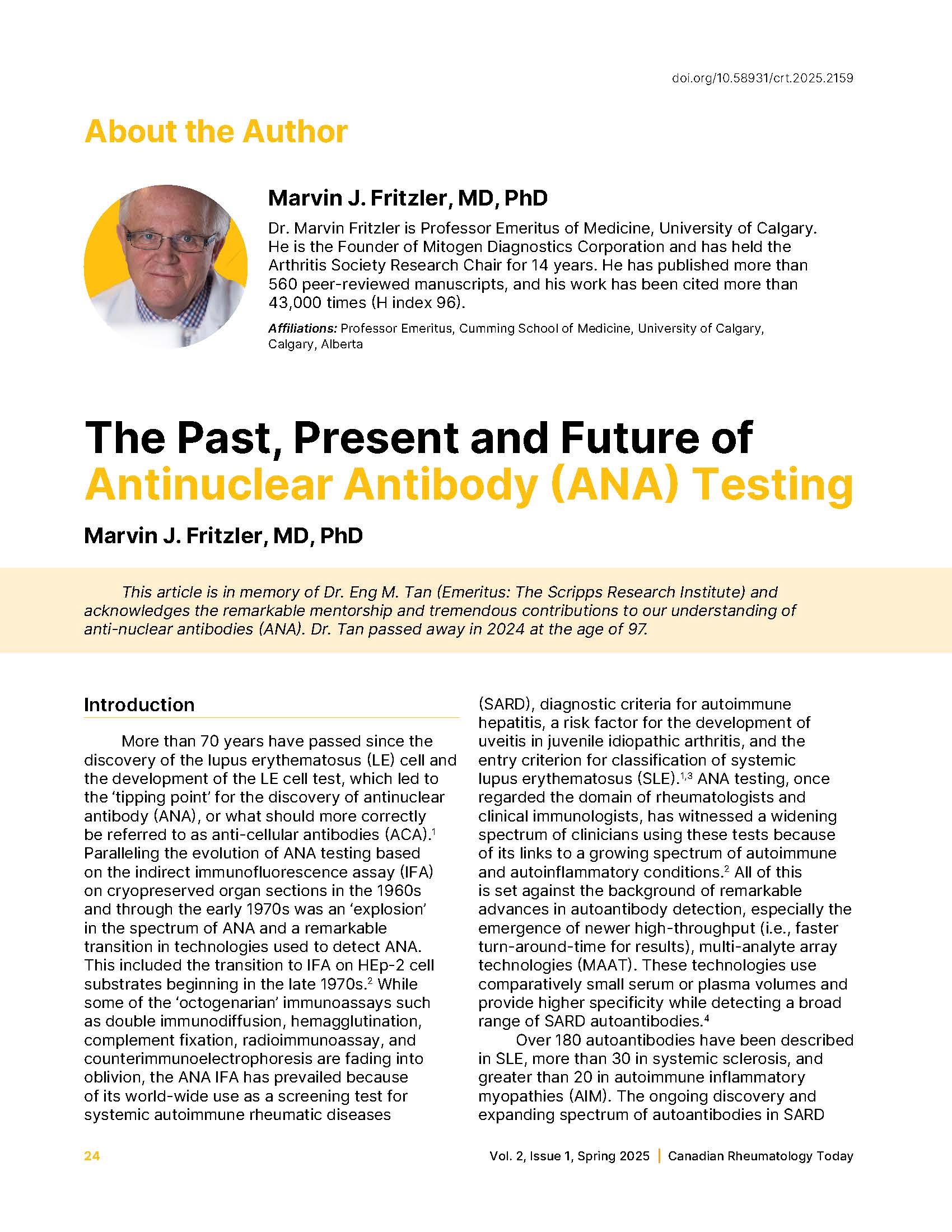The Past, Present and Future of Antinuclear Antibody (ANA) Testing
DOI:
https://doi.org/10.58931/crt.2025.2159Abstract
This article is in memory of Dr. Eng M. Tan (Emeritus: The Scripps Research Institute) and acknowledges the remarkable mentorship and tremendous contributions to our understanding of
anti-nuclear antibodies (ANA). Dr. Tan passed away in 2024 at the age of 97.
More than 70 years have passed since the discovery of the lupus erythematosus (LE) cell and the development of the LE cell test, which led to the ‘tipping point’ for the discovery of antinuclear antibody (ANA), or what should more correctly be referred to as anti-cellular antibodies (ACA). Paralleling the evolution of ANA testing based on the indirect immunofluorescence assay (IFA) on cryopreserved organ sections in the 1960s and through the early 1970s was an ‘explosion’ in the spectrum of ANA and a remarkable transition in technologies used to detect ANA. This included the transition to IFA on HEp-2 cell substrates beginning in the late 1970s. While some of the ‘octogenarian’ immunoassays such as double immunodiffusion, hemagglutination, complement fixation, radioimmunoassay, and counterimmunoelectrophoresis are fading into oblivion, the ANA IFA has prevailed because of its world-wide use as a screening test for systemic autoimmune rheumatic diseases (SARD), diagnostic criteria for autoimmune hepatitis, a risk factor for the development of uveitis in juvenile idiopathic arthritis, and the entry criterion for classification of systemic lupus erythematosus (SLE). ANA testing, once regarded the domain of rheumatologists and clinical immunologists, has witnessed a widening spectrum of clinicians using these tests because of its links to a growing spectrum of autoimmune and autoinflammatory conditions. All of this is set against the background of remarkable advances in autoantibody detection, especially the emergence of newer high-throughput (i.e., faster turn-around‑time for results), multi-analyte array technologies (MAAT). These technologies use comparatively small serum or plasma volumes and provide higher specificity while detecting a broad range of SARD autoantibodies.
References
Damoiseaux J, von Mühlen CA, Garcia-De La Torre I, Carballo OG, de Melo Cruvinel W, Francescantonio PL, et al. International consensus on ANA patterns (ICAP): the bumpy road towards a consensus on reporting ANA results. Auto Immun Highlights. 2016;7(1):1. doi:10.1007/s13317-016-0075-0 DOI: https://doi.org/10.1007/s13317-016-0075-0
Mahler M, Meroni PL, Bossuyt X, Fritzler MJ. Current concepts and future directions for the assessment of autoantibodies to cellular antigens referred to as anti-nuclear antibodies. J Immunol Res. 2014;2014:315179. doi:10.1155/2014/315179 DOI: https://doi.org/10.1155/2014/315179
Andrade LEC, Klotz W, Herold M, Musset L, Damoiseaux J, Infantino M, et al. Reflecting on a decade of the international consensus on ANA patterns (ICAP): accomplishments and challenges from the perspective of the 7th ICAP workshop. Autoimmun Rev. 2024;23(9):103608. doi:10.1016/j.autrev.2024.103608 DOI: https://doi.org/10.1016/j.autrev.2024.103608
Fritzler MJ, Mahler M. Redefining systemic lupus erythematosus - SMAARTT proteomics. Nat Rev Rheumatol. 2018;14(8):451-452. doi:10.1038/s41584-018-0035-3 DOI: https://doi.org/10.1038/s41584-018-0035-3
Fritzler MJ, Choi MY, Satoh M, Mahler M. Autoantibody discovery, assay development and adoption: death valley, the sea of survival and beyond. Front Immunol. 2021;12:679613. doi:10.3389/fimmu.2021.679613 DOI: https://doi.org/10.3389/fimmu.2021.679613
Van den Bremt S, Schouwers S, Van Blerk M, Van Hoovels L. ANA IIF automation: moving towards harmonization? Results of a multicenter study. J Immunol Res. 2017;2017:6038137. doi:10.1155/2017/6038137 DOI: https://doi.org/10.1155/2017/6038137
von Mühlen CA, Garcia-De La Torre I, Infantino M, Damoiseaux J, Andrade LEC, Carballo OG, et al. How to report the antinuclear antibodies (anti-cell antibodies) test on HEp-2 cells: guidelines from the ICAP initiative. Immunol Res. 2021;69(6):594-608. doi:10.1007/s12026-021-09233-0 DOI: https://doi.org/10.1007/s12026-021-09233-0
Dinse GE, Parks CG, Weinberg CR, Co CA, Wilkerson J, Zeldin DC, et al. Increasing prevalence of antinuclear antibodies in the United States. Arthritis Rheumatol. 2022;74(12):2032-2041. doi:10.1002/art.42330 DOI: https://doi.org/10.1002/art.42330
Miller FW. The increasing prevalence of autoimmunity and autoimmune diseases: an urgent call to action for improved understanding, diagnosis, treatment, and prevention. Curr Opin Immunol. 2023;80:102266. doi:10.1016/j.coi.2022.102266 DOI: https://doi.org/10.1016/j.coi.2022.102266
Choi MY, Costenbader KH, Fritzler MJ. Environment and systemic autoimmune rheumatic diseases: an overview and future directions. Front Immunol. 2024;15:1456145. doi:10.3389/fimmu.2024.1456145 DOI: https://doi.org/10.3389/fimmu.2024.1456145
Bossuyt X. DFS70 autoantibodies: clinical utility in antinuclear antibody testing. Clin Chem. 2024;70(2):374-381. doi:10.1093/clinchem/hvad181 DOI: https://doi.org/10.1093/clinchem/hvad181
Fritzler MJ. Choosing wisely: review and commentary on anti-nuclear antibody (ANA) testing. Autoimmun Rev. 2016;15(3):272-280. doi:10.1016/j.autrev.2015.12.002 DOI: https://doi.org/10.1016/j.autrev.2015.12.002
Agency for Healthcare Research and Quality. Effective health care anti-nuclear antibodies (ANA) screening in community populations: Evidence-Based Practice Centers; 2018 [updated 2018 Oct 2, cited 2025 Feb 13]. Available from: https://effectivehealthcare.ahrq.gov/system/files/docs/ana-testing-topic-disposition.pdf.
Brunekreef TE, van den Heuvel HB, Limper M, Leavis H, van Laar JM, Otten H. The predictive value of antinuclear antibodies in patients with suspected connective tissue disease for the development of connective tissue diseases. Clin Exp Rheumatol. 2024;42(1):24-29. doi:10.55563/clinexprheumatol/k2xvu8 DOI: https://doi.org/10.55563/clinexprheumatol/k2xvu8
Yee J, Feldman CH, Oakes EG, Ellrodt J, Guan H, Choi MY, et al. Cost-related medication behaviors for patients with and without systemic autoimmune rheumatic diseases. Arthritis Care Res (Hoboken). 2024. doi:10.1002/acr.25442 DOI: https://doi.org/10.1002/acr.25442
Radin M, Cecchi I, Barinotti A, Wilson Jones G, Arbrile M, Miraglia P, et al. Identifying subsets of patients with undifferentiated connective tissue disease: results from a prospective, real-world experience using particle-based multi-analyte technology. Autoimmun Rev. 2023;22(5):103298. doi:10.1016/j.autrev.2023.103298 DOI: https://doi.org/10.1016/j.autrev.2023.103298
Bellando-Randone S, Del Galdo F, Lepri G, Minier T, Huscher D, Furst DE, et al. Progression of patients with Raynaud’s phenomenon to systemic sclerosis: a five-year analysis of the European Scleroderma Trial and Research group multicentre, longitudinal registry study for Very Early Diagnosis of Systemic Sclerosis (VEDOSS). Lancet Rheumatol. 2021;3(12):e834-e843. doi:10.1016/s2665-9913(21)00244-7 DOI: https://doi.org/10.1016/S2665-9913(21)00244-7
Fritzler MJ. The antinuclear antibody test: last or lasting gasp? Arthritis Rheum. 2011;63(1):19-22. doi:10.1002/art.30078 DOI: https://doi.org/10.1002/art.30078
Tonutti E, Bizzaro N, Morozzi G, Radice A, Cinquanta L, Villalta D, et al. The ANA-reflex test as a model for improving clinical appropriateness in autoimmune diagnostics. Auto Immun Highlights. 2016;7(1):9. doi:10.1007/s13317-016-0080-3 DOI: https://doi.org/10.1007/s13317-016-0080-3
Zhan K, Buhler KA, Chen IY, Fritzler MJ, Choi MY. Systemic lupus in the era of machine learning medicine. Lupus Sci Med. 2024;11(1). doi:10.1136/lupus-2023-001140 DOI: https://doi.org/10.1136/lupus-2023-001140

Downloads
Published
How to Cite
Issue
Section
License
Copyright (c) 2025 Canadian Rheumatology Today

This work is licensed under a Creative Commons Attribution-NonCommercial-NoDerivatives 4.0 International License.
